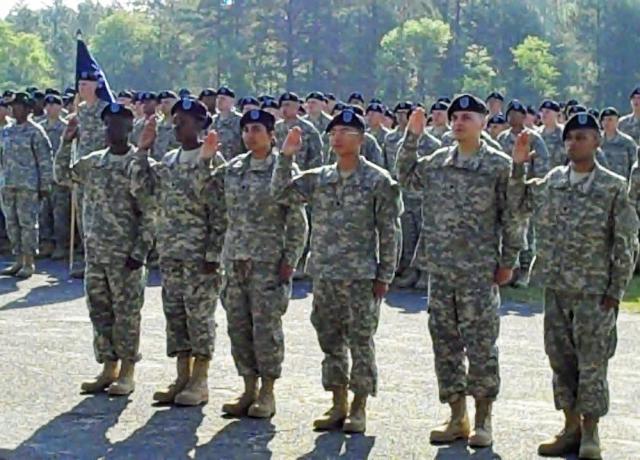Soldiers are now able to obtain their citizenship faster than ever during a time of war, and may soon see United States Citizenship and Immigration Services personnel at their basic combat training location.
Soldiers looking to apply for citizenship can now do so during basic combat training and at a faster clip than they have been able to in the past. In addition, United States Citizenship and Immigration Services, or USCIS, officers may become a permanent fixture at places like Fort Jackson, S.C., officials said.
“If everything continues to align properly, we are aiming to have personnel at Fort Jackson soon and have been coordinating with the Army to have USCIS officers permanently stationed there,” said Chris Rhatigan, spokeswoman for the USCIS. “We will no longer have to send our personnel [temporary duty] there and this will also open up opportunities for foreign national spouses and families of servicemembers.”
The program, originally implemented in August 2009, allows recruits to apply for citizenship and start the application process during their basic combat training, said Capt. Carol Stahl, senior analyst for Recruiting and Retention, Army G-1.
“The Army has offered an expedited naturalization process for Soldiers for some time, however, since we have been at war for as long as we have, it was decided to allow Soldiers to begin the application process during their basic combat training rather than make them wait until they get to their first duty station,” Stahl said.
USCIS personnel trek out to five Army basic combat training posts at least twice a week to administer the naturalization application process, Rhatigan said. Currently, they visit Fort Benning, Ga., Fort Jackson, Fort Knox, Ky., Fort Leonard Wood, Mo., and Fort Sill, Okla.
About 1,000 Soldiers were naturalized during basic combat training in 2010, according to USCIS statistics.
“While this program streamlines the process for servicemembers, it also smooths out the process for USCIS personnel,” Rhatigan said. “We have offices in 29 different countries and we send teams to where the military serves, all over, including Guard and Reserve units.”
The process takes several steps during basic combat training, Rhatigan said. USCIS officers start initial processing and mobile fingerprinting up front, the Soldier goes back to basic training and studies for the test. Upon passing the test and completion of basic combat training, newly trained Soldiers are ready to become naturalized American citizens.
“It really was a win for everyone because the Soldier gets his or her application processed faster, the Army potentially gets a naturalized citizen and the USCIS doesn’t have to fly to war zones to collect fingerprints and administer the associated tasks,” Stahl said.
More than citizenship is forged when the naturalization application process is initiated during basic combat training.
“While troops bond as warriors, they also bond as one citizen to another who will become an American,” Rhatigan said. “Oftentimes troops support each other and will help applicants study for their exam and then show up to naturalization ceremonies to support their new buddies and fellow Americans.”
Rhatigan stressed that just because a recruit is in the Army does not mean he or she is not subject to the same scrutiny that all other applicants are under during the application process.
“Depending on how old an individual is, they could have lived in several different countries and that may take a little longer to investigate,” she said. “But it is a commitment on the USCIS’s behalf to come on post at least twice a week to collect paperwork.”
While the USCIS still holds naturalization ceremonies in theater, having just completed one in Afghanistan, the efforts remain on naturalizing Soldiers upon completion of their basic combat training, Rhatigan said.
“I think this is a great service we provide and we have worked very closely with the Department of Defense to make it happen. These are exceptional men and women and they deserve the best,” she said. “For us, it allows us to go right to the training base and allows a servicemember to complete their basic combat training as a U.S. citizen. That opens up all kinds of doors for them.”
Both Rhatigan and Stahl agreed the naturalization ceremonies held during family days at training bases are ones they won’t likely forget.
“I have been to ceremonies at Fort Sill and Fort Jackson and you have this dynamic of families and troops present, and it just gives you goosebumps it is so moving,” Rhatigan said. “The families are cheering, their fellow troops are cheering them on, people just really connect with this and it comes at a great time because all the work they put in to become a citizen culminates at the end of all the work they do to become a Soldier.”
“It is amazing to see Soldiers receive their citizenship,” Stahl said. “They walk around with a permanent grin they are just so proud. It is simply amazing.”










